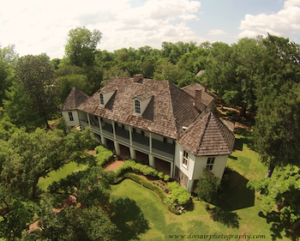
Melrose Plantation
*Melrose Plantation is celebrated on this date in 1832. Also known as Yucca Plantation, the "Big House" is a plantation in the unincorporated community of Melrose in Natchitoches Parish in north central Louisiana.
This is one of the largest plantations in the United States, built by and for free blacks. The plantation land was granted to Louis Metoyer, a son of Marie Thérèse Coincoin, a former slave who became a wealthy businesswoman in the area, and Claude Thomas Pierre Métoyer. The house was completed in 1833 after Louis' death by his son Jean Baptiste Louis Metoyer.
The Metoyer's were free people of color for four generations before the American Civil War. In December 1881, the Metoyer-Hertzog-Bossier Plantation (still unnamed) was sold at auction to satisfy an 1879 judgment rendered against Hertzog-Bossier in Louisiana's Fifth District Circuit. The purchaser, F. R. Cauranneau of New Orleans, held the land and houses as absent until April 1884, when he found a buyer willing to pay $4,500 (~$124,065 in 2022) cash. The new owner, an Irish immigrant merchant named Joseph Henry, had married into a prominent local family. He gave the property the name Melrose, by which it is still known.
Assessment of the remains of European ceramicware indicates that the initial occupancy of Yucca House was post-1810, contrary to the 1796 date that historians had proposed earlier. Real estate broker Robert Andrew Wolf, Jr. of Alexandria, Louisiana, and his partner, John Wasson, designed the current Melrose Plantation structure. They sold the building in 1970. Because of its strong association with the Metoyer family, Melrose Plantation is the primary regional site for the National Park Service's interpretation of the history of Creoles of color in the region.
In 2008, the state included Melrose Plantation among the first twenty-six Louisiana African American Heritage Trail sites. The Association for Preservation of Historic Natchitoches owns the plantation and provides guided tours. Some early twentieth-century traditions associated with the plantation, such as its first owner and origins of architectural style, have been disproved by historical research since the 1970s. An archaeological excavation begun in 2001 has revealed more evidence about the site's early history, owners, and construction.